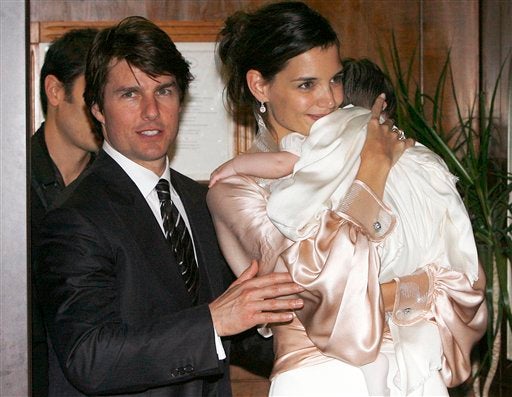
Your support helps us to tell the story
In my reporting on women's reproductive rights, I've witnessed the critical role that independent journalism plays in protecting freedoms and informing the public.
Your support allows us to keep these vital issues in the spotlight. Without your help, we wouldn't be able to fight for truth and justice.
Every contribution ensures that we can continue to report on the stories that impact lives

Kelly Rissman
US News Reporter
Whether it’s a paper we wrote for grade school or a username we still use on Instagram, we identify ourselves by our last names on the daily. That is, unless we make the pivotal decision to change them.
In recent months, many children of celebrities have stopped using their notable names. On August 19, Brad Pitt and Angelina Jolie’s daughter, Shiloh, was granted legal permission to drop her father’s surname, changing her name from “Shiloh Jolie-Pitt” to “Shiloh Jolie.” The legal action came amid the A-listers’ divorce, with Jolie issuing allegations of abuse against her ex in 2022, claiming their breakup occurred after he physically hurt her and two of their six children. The Once Upon a Time in Hollywood actor later denied the claims, calling them “completely untrue.” However, this has led fans to speculate if Shiloh - who’s often photographed publicly with her mother - dropped her last name because of her feelings about her father.
In other circumstances, a celebrity child’s decision to change their name is not related to how close they are to their parents. There’s the apparent move of starting a career without a famous name, such as when Barack and Michelle Obama’s eldest daughter Malia premiered her short film, The Heart, with the stage name Malia Ann.
Speaking to The Independent, Michele Ramsey – a women and gender studies professor at Pennsylvania State University – explained that the now-common tradition of taking our father’s last name dates back to the 18th and 19th centuries, specifically to the legal doctrine of coverture. In his 1765 Commentaries, English jurist Sir William Blackstone defined the doctrine as: “By marriage, the husband and wife are one person in law: that is, the very being or legal existence of the woman is suspended during the marriage.”
By this accord, it’s expected that girls are given their father’s last name when they’re born, before deciding if they want to take another man’s name when getting married. However, Ramsey acknowledged certain conditions of coverture no longer exist in America, partly due to the Equal Rights Amendment (ERA) – an amendment proposed to the US Constitution in 1923 that grants equal rights for all people, regardless of their sex. Although the ERA isn’t a part of the US Constitution, 38 states have ratified the amendment.

“At birth, women’s identities were subsumed under their fathers, and then once they were married, their identities got subsumed under their husbands,” Ramsey said. “The husband could claim the wages of his wife and her work, and he could claim the wages of his children. This female coverture has slowly eroded through time, as it was only in the 1960s that women could be on juries. Without the Equal Rights Amendment, which levels that playing field automatically, you have to have this sort of slow social culture, and cultural and legal erosion.”
In February, Michelle and Barack Obama’s daughter became the subject of scrutiny online when she chose to go by her first and middle name – Malia Ann – in the debut of her short film at Sundance Film Festival. At the time, critics claimed the switch was an attempt at trying to shield herself from any “nepo baby” criticism, prompting The View host Whoopi Goldberg to hit back at these claims. “She knows she’s an Obama, why do you care? Why do you care what she calls herself?” she said.
Matrimonial and family lawyer Stephanie Lehman, a principal at Offit Kurman’s Family Law and Patrice Group in New York, defended Malia’s decision to go by a stage name. Really, Malia isn’t trying to avoid her famous lineage but instead trying to make a name for herself as a filmmaker, beyond the title of the former US president’s daughter. “I think she wants to stand on her own two feet, and she’s a smart girl becoming a filmmaker,” Lehman said. “She has her own identity and wants to figure it out for herself. I don’t think she just wants to be associated with her last name, so this is a smart move for her.”
The decision to change a last name may have more to do with one’s personal life rather than their professional one. When Shiloh Jolie first petitioned to drop “Pitt,” a source claimed to People that her father was “aware and upset,” alleging that the decision was a reminder to the actor that “he’s lost his children.” Shiloh isn’t the first of Pitt and Jolie’s children to publicly drop the name, with the former couple’s youngest daughter recently going by “Vivienne Jolie” in the Playbill for Broadway’s The Outsiders, in which she served as producer’s assistant. The pair’s eldest daughter, Zahara, also notably introduced herself as “Zahara Marley Jolie” when joining her sorority at Spelman College last year.
Just a few months ago, another celebrity daughter dropped her famous last name at the age of 18: Suri Cruise. After the daughter of Tom Cruise and Katie Holmes received her diploma at her high school graduation in May – with her mother by her side – Page Six revealed that the teen went by “Suri Noelle” in the school’s program. The moniker is likely a tribute to the Dawson’s Creek star, whose middle name is Noelle.

It appears that Suri also has an estranged relationship with her father, with sources claiming to Page Six last year that he had “no part” in her life. Cruise was notably absent from his daughter’s graduation too. Instead, he was spotted in London that weekend at Wembley Stadium, among the group of star-studded guests attending Taylor Swift’s Eras Tour concert.
While Pitt is reportedly upset about his daughter’s name change, the decision could say more about the close relationship Shiloh has with her mother. The same could also be the case for Suri, considering the name she used on the graduation program has a special link to Holmes.
“I think that a name is very personal and I can understand how Shiloh’s name change feels like an insult to her father,” the divorce lawyer said. “I’m assuming that for Shiloh, she has a strong relationship with her mom and she identifies more with that name. And maybe it holds some more personal significance for her.”
To change your name at 18 is almost like a coming-of-age moment, signaling the legal right to make such a bold move. The next time we’re given the option to change our name – without requesting to do so ourselves – is when we get married and decide to take our partner’s surname. However, some newlyweds decide to skip the tradition.
In fact, Blake Lively’s late father, Ernie, broke tradition when he took his wife’s name when they were married. While we know the Gossip Girl star as “Lively,” the moniker was actually passed down from her mother, Elaine Lively. Ernie’s last name is “Brown,” which served as the inspiration for Blake’s haircare brand, Blake Brown. When launching her company in New York City on July 31, Blake reflected on her father’s decision to take her mother’s last name.
“My mom had three kids [before marrying Ernie] and he was like: ‘I’m not going to take their name from them, I’m not going to make them take my name. I’ll just take their name.’ That was before I was born,” the actor said, per People.
According to Ramsey, Ernie’s decision to take his wife’s last name shows how fluid our identities are. When we see more people breaking the pattern of women taking a man’s last name, it’s a reminder that we don’t have to stick with the name we grew up with. And while it’s still more common for children to be born with their father’s last name, this shouldn’t necessarily be the common case.
“Ethical language should mirror reality to the best extent possible,” she said. “When a woman gives birth to a child and that child doesn’t have that woman’s name. That child’s last name is from the father’s name. At the minimum, both names should be there. I don’t want to castigate anybody who makes that choice, but it’s just to make a point of just how common it is. But relatively recently, we’ve started chipping away at some of this stuff.”
Ultimately, how we perceive ourselves and what we do with our names is entirely up to us. There’s even the opportunity to change our names multiple times if we please. However, our identities exist beyond that. It’s really our personalities, relationships, and careers that shape us more as individuals than our names.
As for celebrity names, traditions have changed too. Brooklyn Beckham and Nicola Peltz took each other’s surnames when they were married in 2022, making both of them “Peltz Beckham.” Their combined last names not only show their future children that their parents are equal partners, but it could also set a trend for how we view names going forward.
“Nicola and Brooklyn’s kids are going to grow up not knowing anything else besides the two last names, so it’s going to be normal to them. And they won’t know it’s not normal until somebody tells them otherwise,” Ramsey added.







